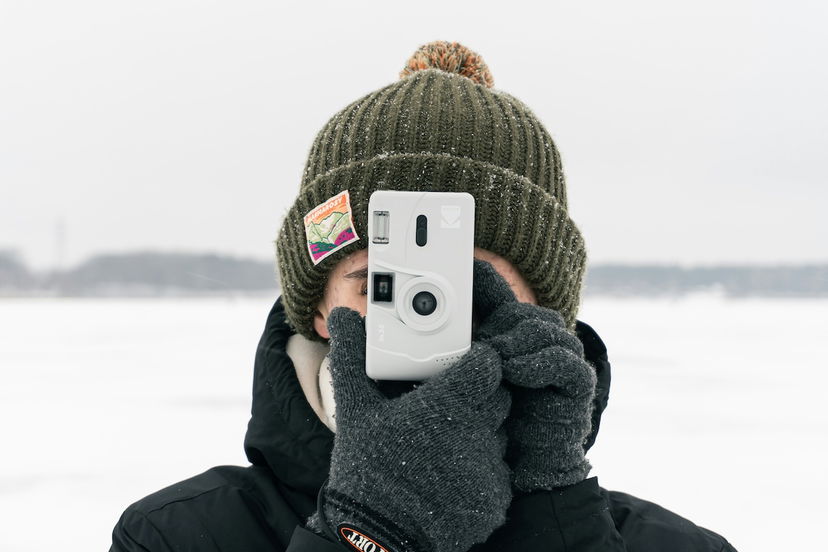Lensball Review (Best Crystal Ball for Photography 2026?)
Is Lensball the best crystal ball for your photography? In this article, you’ll learn all about Lensball and a few of the best alternatives.
Crystal ball photography is a great way to get more creative with your photos. But what are the best options? And where do you get them? We cover everything you need to know!
Lensball Photography: What is Crystal Ball Photography?
Crystal ball photography has been around a long time. A glass spherical ball acts as a lens optic. In some ways, all photography uses a glass ball, because refraction is also used in lenses to render an image.
Refraction works based on light bending when it passes through an object of denser mass. When that object is spherical, the image in the ball gets flipped 180 degrees. How you handle this inverted image will have a significant impact on the success or failure of your crystal ball photo. One method is to use post-processing to flip the picture, though there are other strategies.
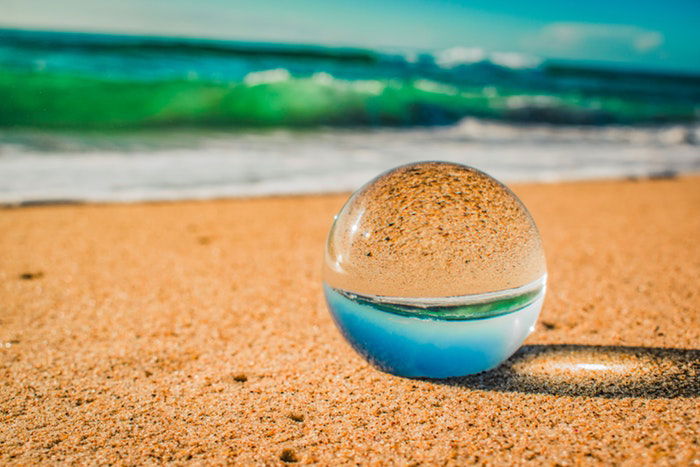
Where Can I Buy a Crystal Ball?
Up until recently the only option for buying a crystal ball would be going to a store or using a service like Amazon. That all changed a couple of years ago, and at the same time, the crystal ball got rebranded as a Lensball. We’ll come to the differences between a Lensball and a crystal ball in a moment.
Below are a list of places you can buy this product.
Lensball.com
This company is based in Holland and is the slickest, and well supported of the new Lensball websites. These are the people behind the rebranding, and they’ve been very successful. They have an active community of photographers who have bought their product. They also look for new products that would be useful to Lensball photographers.
Refractique.com
The rival website to Lensball is Refractique. The site features the Refractique logo. They sell other refractive glass products such as prisms. You’ll find a similar set of products available through this website. One of the main advantages of shopping here is that your ball will arrive faster. This supplier keeps a ready supply of stock that they send as soon as you buy.
Amazon.com
As we all know, the Lensball is simply a rebranded crystal ball, so why not buy a crystal ball through amazon? There are good reasons to do so. For a start, it will almost certainly be cheaper because you’re cutting out the middle man. When buying through Amazon, you’re also not limited by size or color. If you want to buy a 100mm yellow crystal ball, you can do so.
Local Market
The most old school approach to buying a crystal ball is heading out to the shops, or local market. I’ve been photographing with crystal balls since 2008. The first ball I purchased was from a local market in Shanghai. It’s not as convenient as clicking buttons on the internet, but there are good reasons for using a local shop. You’ll be supporting a local vendor, and think of the street photos you can take while you’re out!
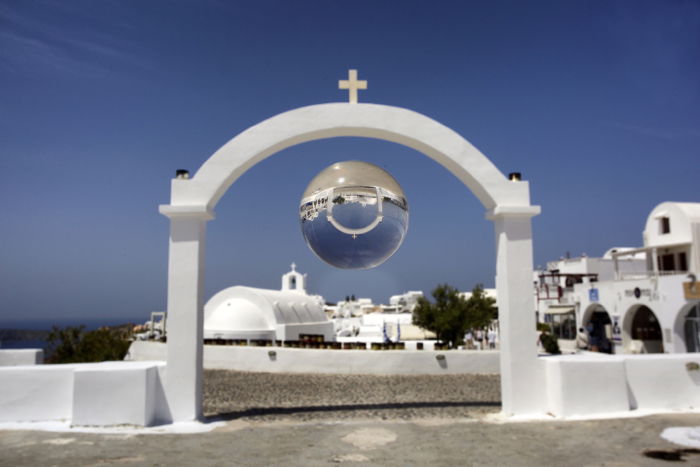
Is Lensball a Good Crystal Ball?
The question is instead, are Lensballs worth the extra money? The extra money is not much when compared to the price of other photographic gear. What’s a 20 dollar difference compared to a 2000 dollar camera lens? But that 20 dollars doubles the price you might pay for a crystal ball through amazon.
Here are some features to consider when deciding if the Lensball is for you:
Crystal Ball Size
The two Lensball websites listed above sell their balls in two sizes. These are 60 and 80mm in diameter. They have, of course, done their research here. People want something not too big, definitely not too heavy, and excellent image quality. An 80mm size is a good option for most photographers.
The balls I’ve been photographing with are 100 or even 120mm in diameter. Those balls are weightier, which would put a lot of people off carrying them around. The image inside the larger balls is better in quality, though. Composition wise the bigger ball can be more dominant in the frame.
It would be great if a bigger ball size were on offer, but the image in the 80mm and 60mm is good enough.
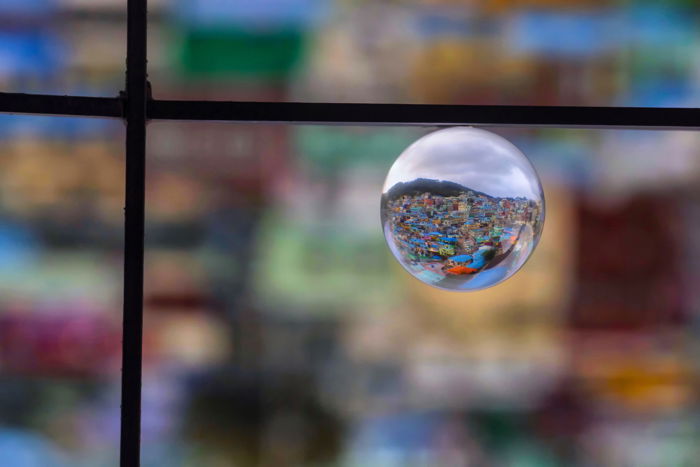
This composition suffers a little because the glass ball is a Lensball, and smaller than the glass balls I have used before. The ball is held in position by the hoop in the metal of an iPhone sim key.
Is Lensball the Best Quality for Crystal Ball Photography?
One of the main justifications given for the higher price tag is the quality of the glass. This glass is the highest quality K9, used for various optics and not just crystal balls. Not all glass balls are for photography.
You may pick up a ball with inferior glass, and this will have some impact on the refracted image. This is like comparing an L series Canon camera lens, with a regular Canon camera lens. Both will record high-quality photos. It’s about how the photographer frames and composes those images.
The better quality glass will produce a crisper and sharper image, so do you want to pay for that extra quality? Even with the better quality glass, you are at risk of scratches on your ball though. To this end, Lensball provides a pouch, which will give the ball some protection.
There is always a cheaper alternative. An old sock can work as well to protect against scratches. The ball slips inside the sock, no matter what size it is.
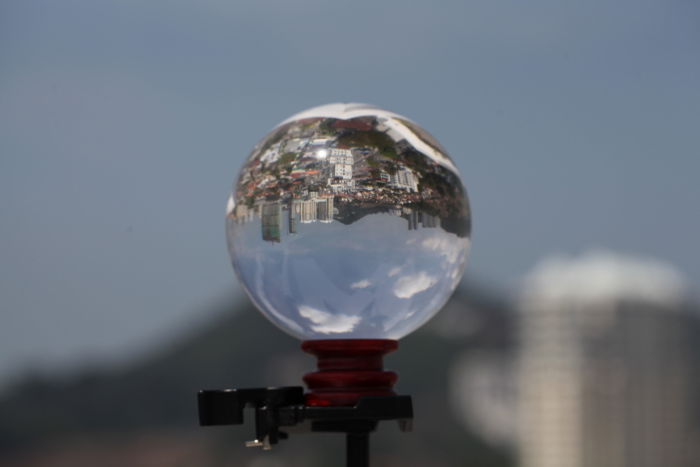
There are plenty of ways to hold the ball in position on a tripod, you don’t need to buy the Lensball holder to do it.
Lensball Community
Lensballs trump card is the community and sense of investment they have formed. Anyone with a crystal ball can post on their site, but Lensball customers are the most invested and keen to learn. Through postcard images and competitions, they inspire people to use their glass spheres.
They also ask their community which products they’d like next and produce them.
Additional Products
There were always going to be products to supplement the Lensball. These make it easier to deal with the compositional challenges of Lensball photography. The main one here is how to place your ball without it rolling away? The solution is a unique tripod head that you can use to place your ball on. This item is useful and works very well.
Again there are alternatives, like placing the ball on the top of the tripod, with the tripod head removed. The circular metal will hold the ball in place as well as the Lensball holder will. There are also Lensball holders made of glass available. These will look more pleasing in a photo than the wooden holders sold with a glass ball.
These are great products, but they also take something away. One of the significant challenges of Lensball photography is developing an eye for a location. The ball has to sit, have a great background, a nice foreground and not roll away.
If you make it easier to place the ball, then you no longer need to find ball resting spots. You lose your knack for finding them, or never develop the skill at all.
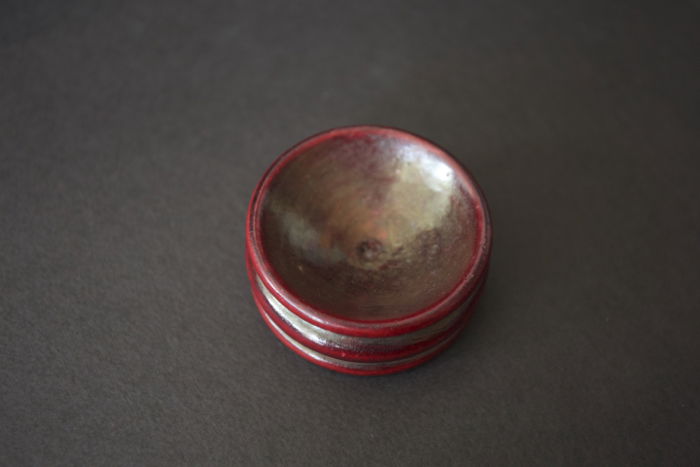
A lot of crystal balls come with a wooden holder. This is not as photogenic as the glass holders sold through Lensball.
Smartphone vs DSLR or Mirrorless for Crystal Ball Photography
Smartphone users dominate the mass market. To gain traction with a broader customer base, the Lensball needs to work for smartphone photos. One of the main advantages of DSLR and mirrorless cameras is the ability to change the lens to specialist macro lenses.
The smartphone is handicapped then, but you can still use it to get great photos. The two sizes of ball work well for photos taken with a smartphone. With a smartphone, you’ll need to accept the background as a fixed element that you can’t blur out.
Safety Issues to Consider with a Crystal Ball
Any glass ball comes with some safety hazards. These hazards aren’t immediately apparent until you think about them. There is the risk of starting a fire and the chance that the ball falls from a great height.
Fire
A crystal ball acts as a magnifying glass when it comes to the sun. The quality of glass is unimportant here. The result will be the same. If your ball anywhere that it’s in direct sunlight, it will focus the sunshine on a surface, and begin to burn it.
There are people whose houses have burnt down because they placed their ball in sunlight. It’s unlikely you’ll cause a bush-fire while photographing in the wild, but be aware of this threat and take precautions.
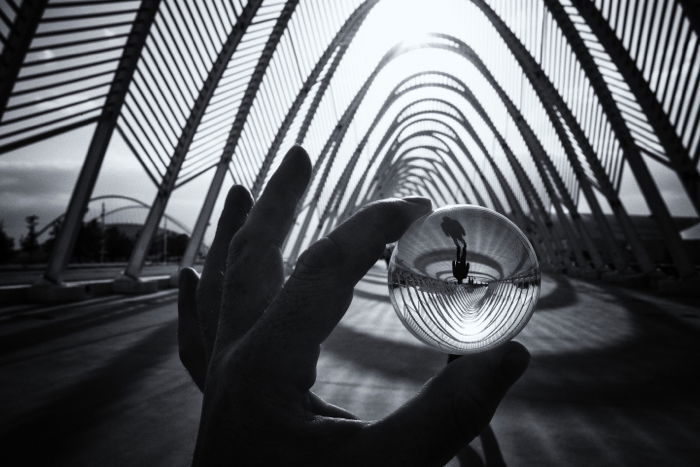
The smaller size Lensballs are great when you want to take a handheld photo. They are just the right size to hold in the way shown in this picture.
Damage by Dropping
Another potential risk is that the ball rolls off the surface you so selected for it. This could be because the surface wasn’t completely flat. On a windy day, a strong gust of wind can be enough to move the ball.
If you are photographing from a high location and the ball falls over the edge, it could cause a great deal of damage. Even if the fall is not that high, you could damage your ball from the impact of a fall. It will be more challenging to use the ball to get high-quality images, with a dent mark somewhere on its surface.
Common Questions About Crystal Ball Photography
The following are some of the most common questions people ask about crystal balls. Here you can find detailed answers to these questions.
What Size Crystal Ball Is Best for Photography?
The smaller the ball, the easier it is to carry, but the image inside the ball becomes distorted. But a giant glass ball is heavy to carry around! So what’s the sweet spot between image clarity and weight? The answer will vary from photographer to photographer, but 80mm is an excellent place to start.
How Do You Use a Crystal Ball for Photography?
The typical way to use a crystal ball in photography is for refraction photography. You use the ball as an external lens optic and then photograph the refracted image within the ball.
What Is a Photography Ball?
Photography ball is another name for a glass ball which you use to photograph through in photography. They are also sometimes referred to as a crystal ball or a Lensball.
What Can You Do with a Crystal Ball?
A crystal ball can be an ornament, but it’s much more fun to use in photography! You can use them for refraction, but they also make a cute prop for a model to use.
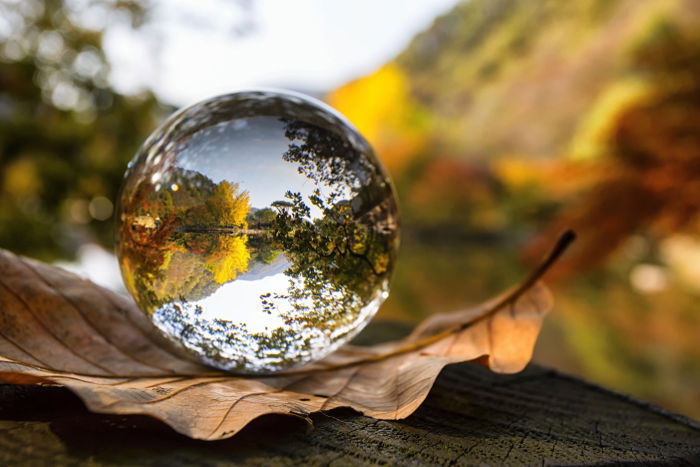
The Lensball is one option on the market when it comes to buying a crystal glass ball. The image with the ball is crisp because of the use of better quality glass.
Conclusion
Crystal ball photography is a lot of fun, and there are many ways you can use it in your creative photography.
Is the Lensball worth the extra cash? The Lensball case is useful, and the quality of glass also means the image in the ball will be crisper. The branding and support from the community of Lensball photographers are fantastic. But those with regular crystal balls can contribute to these groups as well.
If I were buying a crystal ball for photography, I’d likely buy from one of the Lensball sites. They offer an excellent package.
What do you think? Have you tried Lensball photography? If you have, share your thoughts and images in the comments section to this article!
